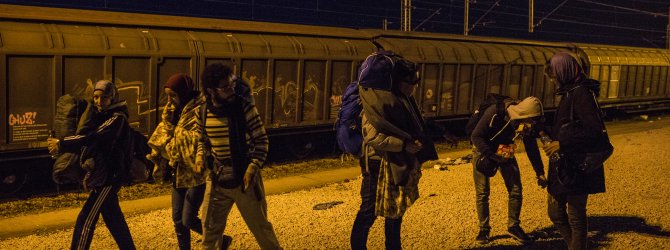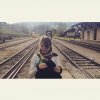-
On the Refugee Route Part IV: Crossing Through Europe’s ...
On the Refugee Route Part IV: Crossing Through Europe’s Firewall

We transited through five Greek islands –Rhodes, Symi, Nisyros, Kos and Kalymnos— as we sailed westward across the Aegean Sea, collecting more asylum seekers at every stop. Exhausted men and women passed out in the narrow corridors, while others hand washed their clothes, and those who could not sleep gazed at the colorful clothes hung out to dry on the deck, fluttering in unison with Greek flags.
The group which first started out with Somar, his sisters and cousins expanded over time to include Somar’s fellow village friends, as well as strangers. We finally arrived at Piraeus port, and against the cacophony of crashing waves people congratulated one another on finally making it to Europe. They then debated the ‘service memo’ system, which was enforced to allow Balkan states to track the movement (and hence the protection) of asylum seekers as they progressed further West. But due to the lack of clear information, they didn’t appreciate the initiative. Instead, they heralded serious warnings about the risks of registering early on prior to reaching one’s chosen state of asylum. Their mistrust of the Dublin Regulation led them to a fear of being held in the Balkan States against their will.
In the close distance, we came across the self-proclaimed “Sky Travels”, a smuggling business that allegedly offers daily trips to the Macedonian-Greek borders. I was starting to get paranoid about smugglers disguised in business attire and flowery language.
***
Somar didn’t have the slightest idea about how we were going to reach Germany, where his older brother was anxiously waiting. The “how” and “by when” were difficult questions to which his response was an unwavering “we’ll see”
But after some deliberation, we finally boarded a bus that dropped us off at a camp in Evzoni on the Greek-Macedonian border where we were met by Doctors without Borders (MSF), the United Nation’s Refugee Agency (UNHCR), Médecins du Monde and others. I felt a sense of security when we reached the humanitarian agencies. We waited for less than 24 hours at this camp before making our way to another one on the Macedonian side of the border.
Now that the journey of camps had started, Somar was able to focus on tending to his sisters and cousins who mostly responded well to his comical antics. The 15-year-olds in the group maintained their spirits by joking, singing and telling stories. One night, as we lay together in the corner in some tent at one of the camps along the way, Lubna told me she was glad her parents didn’t venture on the journey: “we can handle it as youngsters, but especially the hygiene issue, my parents wouldn’t have handled it.”
.png)
Somar's sister laughs during a moment of light relief in Macedonia
As we queued at the Macedonian side of the border, Somar’s 20-year-old sister Salsabil started helping the Macedonian volunteers collecting trash when one rebutted: “no, you are refugees, this is our job, do not worry about the trash”. An embarrassed Salsabil was amazed that anyone felt the need to clean up after refugees. Salsabil had been against the idea of getting smuggled to Europe since the start, but couldn’t go against her parents’ wishes.
Beyond that queue was another one that led to a graffiti-covered train that would wheel us closer to Serbia. Tickets cost €25 per person. Some passengers locked themselves into cabins to reserve space for family members. Others, including Somar and his friends, packed into the aisles like sardines. The situation was chaotic and unclean; sleep was our only escape.
As I drifted off, my mind rested on a story Somar had told me back in Turkey: A young man once invited his friend to a game of chess. His friend, who seemed offended, rejected the invitation and explained: “A game where 15 strong, capable pieces fight on the battleground to protect one old man? Not the kind I like to play.” The simple anti-monarchy narrative echoed his outcry against the geopolitics that now enveloped his family. He then told me that he no longer enjoyed chess, despite it being a game he often played with his father’s friends back in Syria.

Members of the group we travelled with smoking in the hallways of a packed train heading towards Serbia
The train dropped us at a transit camp in the Macedonian city of Kumanovo. The only way to reach Serbia was by foot. The night was cold, our muscles ached from the long journey, and Somar’s younger sister Lubna felt sick. So we decided to spend a night in the camp where we would rest and charge our cellphones.
***
We woke at 6.00 am to make the 90-minute walk across the border. Heading many warnings about bandits, we joined a larger group of asylum seekers. Somar stopped for a young man and helped him push his elderly father’s wheelchair which was sinking into the mud. Later, we spotted an older man who was limping his way alone. Somar held his hand as he listened to his story of losing his family to a mortar bomb that hit his home.
The Serbian district of Pcinjki again received us with greedy taxi drivers who howled at us offering to drop us off at a train station some 30-minute drive away in exchange for 150 euros per car. We resisted the first couple of cars, but exhaustion led us to fall for one eventually.
His car sped past those who continued on foot (some of whom were middle-aged women) who dragged their exhausted bodies carrying their backpacks along the long, windy road. Then the taxi driver interrupted my thoughts in an attempt to converse as American hip-hop songs played in the background saying:. “You Syria? Yes, Syria very good. Money money!”
We made it to the train station around 9:00 am, and had to wait till 4:00 pm for the train. While our friends camped on the sidewalk and decided to get some rest, the photographer and I decided to go out for a walk. It was an unfortunate decision, as it led us to getting caught by the Serbian police and thrown into a police station for hours until the decision to expel us from the country was issued. It was only then that I understood what it meant to be criminalized as an illegal immigrant in a foreign country; the status I momentarily shared with hundreds of thousands of refugees that face the risk of deportation.
Dina Baslan is a Jordanian researcher and former aid worker. In September 2015, she accompanied her friend Somar Kreker to Europe, hiding among the refugees to nuance her understanding of the migration phenomenon first hand. This is the fourth in a five-part series of articles documenting her journey, created in collaboration with the Institute's Head of Communications, Roisin Taylor.

